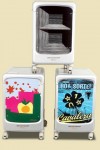Whirlpool’s push to jump-start innovation [Business Week]
After some failed unstructured attempts, “they realized in 2002 that they had to bring more order to the innovation process. For starters, they decided that new ideas would have to enhance the company’s existing brands or products. Top management would evaluate and fund all new proposals at monthly innovation-board meetings. These groups, in turn, reported to Whirlpool’s nine-member executive committee. Green-lighted projects would be assigned to pros — representatives from the design, market research, R&E, and manufacturing departments — to see them through.”
“To make it easier to design products that reflected consumers’ needs and desires, […] innovators [had] to demonstrate that their proposals were something that real people would buy [and that] the new product would command above-average markups”. This of course involved consumer research.
“Since 2003, innovation revenue has quadrupled annually, easily surpassing goals. […] Moreover, Whirlpool is no longer caught in a price war.”





I was startled to see that it was Whirlpool that’s gotten a call from the Innovation God. In the 1970s and 1980s, when I was in grad school, Whirlpool was spoken of as the paragon of innovation. In fact, it was Whirlpool that first popularized the idea that anticipating new product features and changes early in a product’s lifestyle — at the level of ideation if that was possible, but at least well before production design began — was more valuable than waiting to the end. I remember reading an exciting paper by a Whirlpool designer describing this process of anticipatory innovation. They even had a name for it. So 15 years later, they have no corporate memory? Odd.